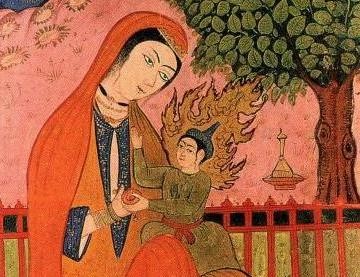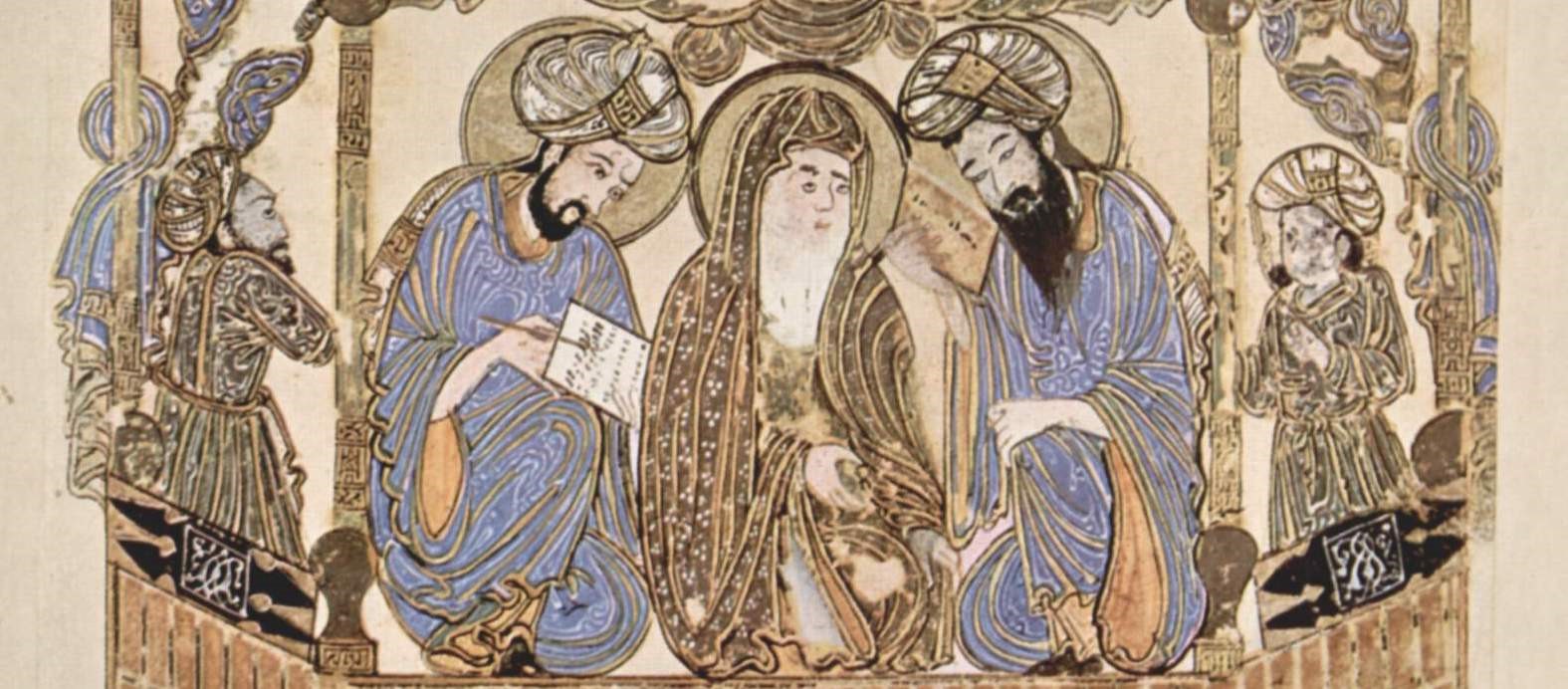
- Programs & Services
- Learning & Development
- Health & Wellness
- Faith & Traditions
- Economic & Financial Planning
- Community Engagement
- Support Services
- News
- Upcoming Events
- Watch Now
- Opportunities
- the.ismaili
- Feedback
- Login
On December 25 each year, Christmas is observed to mark the birth of Jesus, or Nabi Isa (alayhi-salam) as he is referred to in the Holy Qur’an. Christmas offers us an opportunity to reflect on the significance of Nabi Isa in Islamic traditions.
Nabi Isa in the Holy Qur’an
Nabi Isa is mentioned in the Qur’an-e-Sharif as one of the prophets who brought scripture and guidance to humankind, in the times before Prophet Muhammad (peace be upon him and his family). The Qur’an gives him the unique title of “Messiah” (al-masih in Arabic), meaning “anointed one.” Nabi Isa’s name occurs in the Qur’an twenty-five times, often in the form “Isa ibn Maryam,” meaning “Jesus son of Mary.” In addition, Sura Maryam in the Qur’an is named after Nabi Isa’s mother, Bibi Maryam.
The Qur’an includes many aspects of the narrative found in the Gospels about Nabi Isa’s life. This includes his virgin birth, the signs given to him by God, and that he was raised by God into His presence. It also suggests his future return. However, the Qur’an denies that Nabi Isa was himself divine.
Surat Aal-e-Imran mentions that angels announced the coming birth of Nabi Isa, saying: “The angels said, ‘O Maryam, Allah gives you good news of a Word [kalima] from Him. His name is al-Masih [the Messiah], Isa ibn Maryam, honoured in this world and in the next, and of those brought near [to God]’” (3:45).

The Prophets of the Abrahamic Tradition
The Holy Qur’an frequently mentions that divine guidance was sent to humankind through various prophets. One ayah says:
“So [you believers], say, ‘We believe in God and in what was sent down to us and what was sent down to Ibrahim (Abraham), Isma’il (Ishmael), Ishaq (Isaac), Ya’qub (Jacob), and the Tribes, and what was given to Musa (Moses), Isa (Jesus), and all the prophets by their Lord. We make no distinction between any of them, and we devote ourselves to Him’” (2:136).
This view that all prophets are considered to be equal is also supported by a widely-reported hadith, in which Prophet Muhammad is believed to have said:
“Both in this world and in the Hereafter, I am the nearest of all the people to Jesus, the son of Mary. The prophets are paternal brothers; their mothers are different, but their religion is one.”
Many Qur’anic verses also describe the prophets as belonging to the same family. For example, there is a line of prophets descended from Nabi Ibrahim (alayhi-salam). Both of his sons, Nabi Ishaq and Nabi Isma’il were prophets, as was Nabi Ishaq’s son, Nabi Ya’qub, and his grandson, Nabi Yusuf, or Joseph (alayhum-as-salam).
Thus, Allah chose certain families over others based on their devotion, submission and faith towards the Divine, as reflected in the following Qur’anic verses:
“Allah chose Adam and Nuh (Noah), the family of Ibrahim, and the family of Imran above all mankind: a progeny one from the other” (3:33-34).
“We have already given the family of Ibrahim the Book and Wisdom and conferred upon them a great kingdom” (4:54).
According to Islamic tradition, Prophet Muhammad was a descendant of Nabi Ibrahim through Nabi Isma’il, while Nabi Musa and Nabi Isa were descendants of Nabi Ibrahim through Nabi Ishaq. For the Shia, this elevated status of Nabi Ibrahim’s family extends also to Hazrat Ali, Bibi Fatima and the Imams descended from them.
Mawlana Hazar Imam has often highlighted this shared Abrahamic heritage. Speaking in Houston, USA in 2002, he said:
“The shared destiny of the ethos of the Abrahamic tradition that unites Christians, Jews and Muslims is governed by the duty of loving care to help nurture each life that is born to its God-given potential.”

Nabi Isa as a Spiritual Exemplar
In Qur’anic commentaries, Nabi Isa is depicted as someone who embodied the qualities of piety and concern for the needy, whose example inspired Prophet Muhammad. In Sufi literature, Nabi Isa is often portrayed as an example of detachment from the world and closeness to God.
In his article, “Jesus, Christians and Christianity in the Thought of the Ikhwan al-Safa’,” Dr. Omar Ali-de-Unzaga explains that, for the Ikhwan al-Safa’, Nabi Isa is a spiritual exemplar par excellence.
The Ikhwan al-Safa’, or Brethren of Purity, were a group of anonymous scholars who wrote a series of epistles (rasa’il in Arabic). Their identity and spiritual affiliation is the subject of debate, although several scholars have suggested they may have been Ismailis of the pre-Fatimid era.
Dr. Ali-de-Unzaga writes:
“Jesus figures prominently in the Rasa’il, as one of the exemplars who embodied the views of the Ikhwan al-Safa’: belief in the eternity of the soul and the pursuit of the purification of the soul from matter by detachment from the bodily realm.”

In the Memoirs of Aga Khan, Imam Sultan Mahomed Shah (alayhi-salam) mentions Nabi Isa as someone who attained spiritual enlightenment and power:
“…some men are born with such natural spiritual capacities and possibilities of development, that they have direct experience of that great love, that all-embracing, all-consuming love, which direct contact with reality gives to the human soul. Hafiz, indeed, has said that men like Jesus Christ, and Muslim mystics like Mansour and Bayezid and others, have possessed that spiritual power of the greater love; that any of us, if the Holy Spirit ever-present grants us that enlightenment, can, being thus blessed, have the power which Christ had…”
Common Ground: Pluralism and Nabi Isa
Mawlana Hazar Imam has also spoken about Nabi Isa in connection with pluralism. In his speech upon receiving the “Tolerance” award from the Tutzing Evangelical Academy in Germany in 2006, our beloved Imam said:
“Despite the long history of religious conflict, there is a long counter-history of religious focus on tolerance as a central virtue – on welcoming the stranger and loving one's neighbour.
‘Who is my Neighbor?’ – one of the central Christian narratives asks. Jesus responds by telling the story of the Good Samaritan – a foreigner, a representative of the Other, who reaches out sympathetically, across ethnic and cultural divides, to show mercy to the fallen stranger at the side of the road.”
Conclusion
In Islamic traditions, Nabi Isa is held in high regard as a messenger of God and an exemplar of the ideals of piety and austerity. He is also part of the shared heritage that binds the monotheistic faiths of Judaism, Christianity, and Islam. Together, they are known in the Qur’an as the Ahl al-Kitab, or People of the Book, that is, people to whom Allah sent revelation.
Christmas provides us with an opportunity to reflect upon the life and significance of an important prophet in our own tradition. It is also a reminder of our duty to build bridges with our brothers and sisters of all faiths, remembering that we are all born from a single soul. It offers a chance for us to show our respect for the diversity of festivals that are celebrated in our larger society, and indeed, amongst members of our own families who may be of other faiths.
To conclude, we end with a quote from Mawlana Hazar Imam’s speech at the opening ceremony of the Ismaili Centre, Vancouver in 1985:
“Islam is the last of the world's great monotheistic faiths to be revealed and is essentially tolerant. It entertains no opposition to earlier beliefs. On the contrary it recognises them as being part of God's message to mankind. To all Muslims – Shia and Sunni alike – the ‘people of the book’ are the people of all monotheistic faiths, and a wide, all-embracing, vision of the brotherhood of man and the unity of God is among the most fundamental of the faith's teaching.”
Discussion Questions
Further Reading
Opinions, statements, or other information displayed through external links above are provided as additional reference material and do not necessarily represent the opinions of, or imply endorsement by, the Ismaili Institutions for Canada.